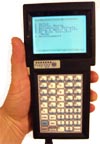 |
 |
Tcl for Embedded Applications |

 |
 |
Tcl for Embedded Applications |

These procedures provide a convenient mechanism for assembling Tcl commands from an input source where command boundaries are not obvious. For example, if input is being read from a terminal, a user may type commands that span multiple lines. In situations like this, Tcl_AssembleCmd can be called with the individual lines as they are received. It buffers the lines internally and returns full commands when they are complete.
A command buffer is created by calling Tcl_CreateCmdBuf, and it is deleted by calling Tcl_DeleteCmdBuf. There may be any number of command buffers for a particular program or even for a particular interpreter; in most cases there should be one buffer for each independent source of command input.
When input arrives from a source you should call Tcl_AssembleCmd, passing it the new input as the string argument. Tcl_AssembleCmd will add the new input to anything currently buffered in buffer. If the information now buffered represents a complete Tcl command (i.e. there are no unclosed quotes, braces, brackets, or variable references), then Tcl_AssembleCmd returns a pointer to the complete command and arranges for the buffer to be cleared on the next call to Tcl_AssembleCmd. If the command is still incomplete (because, for example, there are unmatched braces) then Tcl_AssembleCmd returns NULL. Tcl_AssembleCmd keeps a private copy of the command being assembled, so that the caller need not preserve the contents of string between calls to Tcl_AssembleCmd. Tcl_AssembleCmd supports commands of arbitrary length (up to the total memory limit imposed by the operating system, if any).
The procedure Tcl_CommandComplete takes a Tcl command string as argument and determines whether the command string is complete in the sense defined above. If so then it returns 1; otherwise it returns 0.
Copyright © 1989-1994 The Regents of the University of California. Copyright © 1994-1996 Sun Microsystems, Inc.